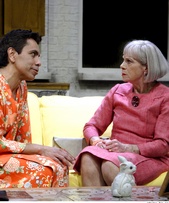SITE GUIDE
SEARCH
REVIEWS
REVIEW ARCHIVES
ADVERTISING AT CURTAINUP
FEATURES
NEWS
Etcetera and
Short Term Listings
LISTINGS
Broadway
Off-Broadway
NYC Restaurants
BOOKS and CDs
OTHER PLACES
Berkshires
London
California
New Jersey
DC
Connecticut
Philadelphia
Elsewhere
QUOTES
TKTS
PLAYWRIGHTS' ALBUMS
LETTERS TO EDITOR
FILM
LINKS
MISCELLANEOUS
Free Updates
Masthead
Writing for Us
A CurtainUp  London Review
London Review
 London Review
London ReviewTorch Song Trilogy
|
There is nothing more frustrating than a one sided conversation.
— Arnold
|

David Bedella as Arnold and Sara Kestelman as Mrs Beckoff (Photo: Catherine Ashmore) |
The first play, The International Stud, sets the scene for the others, with Arnold as a witty raconteur of his string of disastrous relationships and hopeless affairs. He plays “music to be miserable by” and concentrates on one particular relationship. That's with Canadian Ed (Joe McFadden) who has bi-sexual leanings and conforms to family expectations by finding a girlfriend.
In the second play Fugue in a Nursery Arnold goes to stay with Ed and his girlfriend Laurel (Laura Piper), taking with him Arnold’s beautiful new and young boyfriend, Alan (Tom Rhys Harries). “Imagine being hostess to your lover’s ex and his new boyfriend,” says Laurel.
After the interval the concluding Widows and Children First sees Ed is renewing his relationship with Arnold who is fostering a quirky gay teenager, David ( irresistibly played by Perry Millward), and is enduring a visit from his mother, Mrs Beckoff (an irrepressible Sara Kestelman). Arnold has lost Alan in tragic circumstances.
The first play has a wonderful set of dressing room mirrors and doors as David Bedella changes in and out and in and out of his drag costume, makeup and wig. Joe McFadden has a sweet innocence about him which allows us to forgive his sexual ambivalence. Much of this consists of witty monologue as Arnold sets the New York gay scene including a visit to the anonymous “back room” in a dive. In Fugue in a Nursery, the action is choreographed with all four gymnastically playing somersaults on the diagonals of tw double beds to the lone harpist accompaniment. The shifting relationship permutations are explored and developed and Laurel goes off “pop” saying “I’m fine,” when she is obviously not at all fine. The rows emerge and Laurel and Arnold confide betrayals in each other. There is a shock at the end of this act which I won’t spoil.
T Widows and Children First introduces Arnold’s difficult mother and eccentric fostered teenager, David. The witty repartee ricochets round the walls of the Manhattan apartment which is filled with bunny ceramics and soft toys and posters of Judy Garland, Billie Holiday and Lisa Minnelli. Some of the double standards are explored as Mrs Beckoff rages about the death of her husband, voices her intolerance of her son’s sexual orientation and Arnold expresses what he would feel if David brought home a girlfriend. As Arnold explains that he is fostering David because “David is gay,” his mother retorts, “But he’s only been here 6 months!” as if there was a causal relationship. We tolerate Mrs Beckoff’s prejudices because she is also witty. “I’m telling you Arnold, Women’s Liberation” is giving me varicose veins!”
I became fond of Fierstein’s characters and was quite moved by the closing declaration of “I will never turn my back on you” which reminded me of the song “I am what I am”. Perry Millward as David with a ridiculously puffed up hairstyle preens but has found a family where he can express himself. All this is set before the horrible advent of AIDs. The director has added his own choice of songs including “My Funny Valentine”, “You Made Me Love You” and “Yes Sir That’s My Baby”. Douglas Hodge has coaxed excellent performances from his actors and Kestelman and Bedella are on top form.
|
Subscribe to our FREE email updates with a note from editor Elyse Sommer about additions to the website -- with main page hot links to the latest features posted at our numerous locations. To subscribe,
E-mail: esommer@curtainup.comesommer@curtainup.com
put SUBSCRIBE CURTAINUP EMAIL UPDATE in the subject line and your full name and email address in the body of the message -- if you can spare a minute, tell us how you came to CurtainUp and from what part of the country. |
| Torch Song Trilogy
Written by Harvey Fierstein Directed by Douglas Hodge Starring: David Bedella, Sara Kestelman, Tom Rhys Harries, Joe McFadden, Perry Millward, Laura Pyper Design: Soutra Gilmour Lighting: Paul Anderson Sound: Gareth Owen Harpist: Rebecca Royce Running time: Two hours and 55 minutes with one interval Box Office: 020 7378 1713 Website: www.menierchocolatefactory.com Booking to 12th August 2012 Reviewed by Lizzie Loveridge based on 12th June 2012 performance at the Menier Chocolate Factory, Southwark Street London SE1 1RU (Rail/Tube: London Bridge) |
|
REVIEW FEEDBACK Highlight one of the responses below and click "copy" or"CTRL+C"
Paste the highlighted text into the subject line (CTRL+ V): Feel free to add detailed comments in the body of the email . . . also the names and emails of any friends to whom you'd like us to forward a copy of this review. |




